Ecosystem services and carbon credits support small-scale farmers in Peru
In the Andean countries, the voluntary market for carbon credits is becoming increasingly important. Different models and initiatives are available, but Acorn, proposed by the Dutch bank Rabobank, has been generating special interest, particularly in Peru, Colombia and Nicaragua. Acorn promises to democratize access to carbon markets for small-scale producers, by compensating them for planting and maintaining trees in their agroforestry systems.
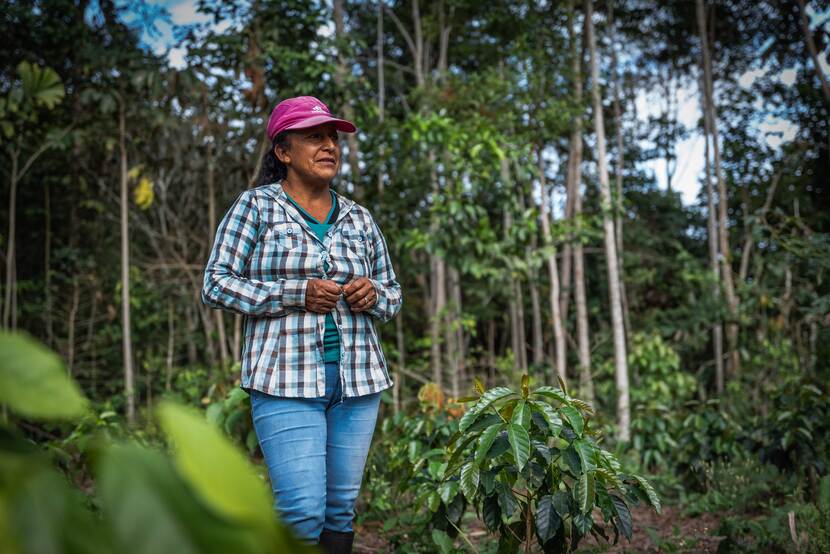
Acorn is an initiative of the Rabobank innovation team and aims to tackle current challenges posed by climate change and to create economic benefits and direct impact on the production systems of small-scale producers in emerging regions. To achieve this, Acorn wants to make use of agroforestry. Together with network organisation Solidaridad as one of its local partners and in collaboration with off takers such as Microsoft, Acorn uses the transition towards agroforestry production systems to promote a series of ecosystem services and generating carbon credits, known as Carbon Removal Units (CRU) that will later be sold on the voluntary carbon market.
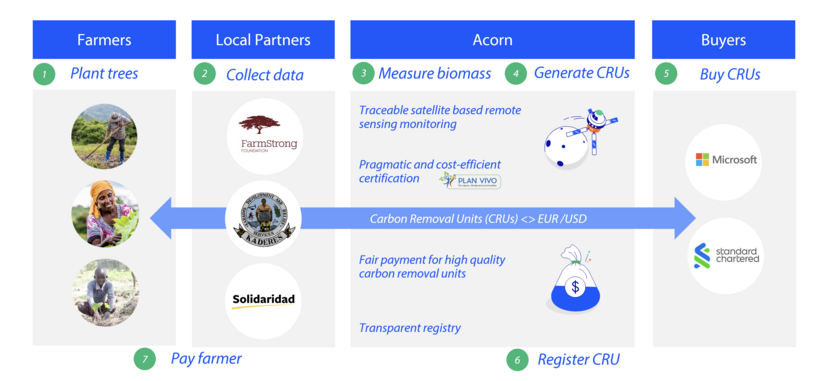
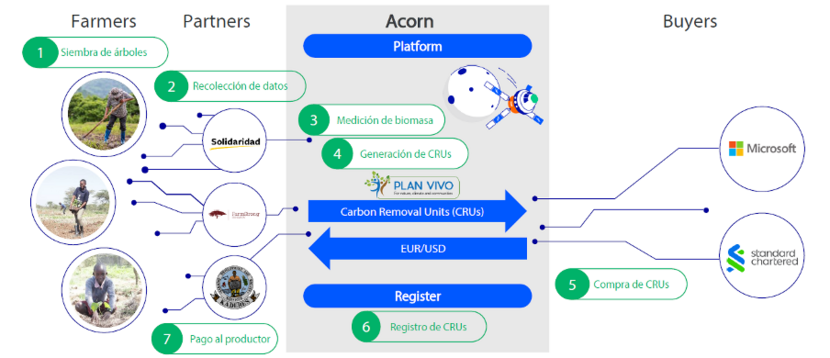
Unlike monoculture production, the agroforestry system generates several benefits. It promotes endemic biodiversity and soil health, diversifies the food basket of small-scale producers, improves yields per hectare, diversifies family income, and promotes reforestation. Although this type of system results in higher implementation costs, the benefits generated greatly exceed the initial investment. That is why interest in Acorn has been growing in Peru, Colombia and Nicaragua. And other countries in the region are paying attention to its development as well.
‘Technology allows Acorn to bring together actors that are far apart in the different value chains’
137.136 farmers are involved in Acorn
Worldwide, 137.136 farmers are involved in Acorn. The project has issued 148.490 CRUs and covers 154.328 hectares. In Peru, 1.000 producers in the coffee value chain are part of the project in the San Martin region. These small-scale producers have plots of 1.3 hectares on average and have managed to remove more than 10.000 tons of CO2 from the atmosphere, generating more than €160.000 in benefits for the community.
In Colombia, in the department of Risaralda, the project focuses on the transition of agroforestry by applying traditional knowledge and planting native tree species that allow the capture of more than 12.000 tons of CO2, helping more than 5.000 small-scale coffee producers on 7.600 hectares.
Technology is a fundamental ally
Technology is a fundamental ally to modern or precision agriculture, as it is to Acorn and inclusive models of agriculture. It has two great benefits.
Firstly, it allows the market to deliver practical, scalable solutions producing real results in a short time. Thanks to satellite imaging technology and machine learning models, tree growth can be measured at the level of the polygon or plot of land, something that would be extremely difficult and expensive and, in simple terms, unrealistic to carry out manually.
Technology also allows Acorn to bring together actors that are far apart in the different value chains, such as large corporations like Microsoft and Bain & Company with small producers through traceability platforms.
The main beneficiary is the small-scale producer
Two major features differentiate Acorn from other proposals on the market. Firstly, Acorn employs technology which precisely measures the biomass generated. This allows it to put CRUs on the market ex-post, which means that only the actual carbon removed in the last year is taken into account. Unlike other proposals in the market that sell captures of a possible future value, which they think will be generated.
Likewise, other proposals promote a centralized system with a wide margin of return that mainly benefits the companies in the system. Acorn, for its part, is based on the democratization of the voluntary carbon market. The main beneficiary is the small-scale producer, who receives 80% of the CRU’s sales. Also, Acorn allows a mixed approach to pay-out: in-kind and monetary payments as a direct complement to income of households.
Currently, the average market price of a carbon credit (1 ton) is approximately €5. Acorn sells at the minimum price of €20 for each CRU, which ensures that at least €16 (often a combination of cash and in-kind) will go to the smallholder farmer. Added to this, the CRUs are offered to companies in the same production chains with which they work. This means an international coffee trader will buy the CRUs generated by the coffee growers that supply them with coffee beans, transforming their own value chains into more sustainable chains.
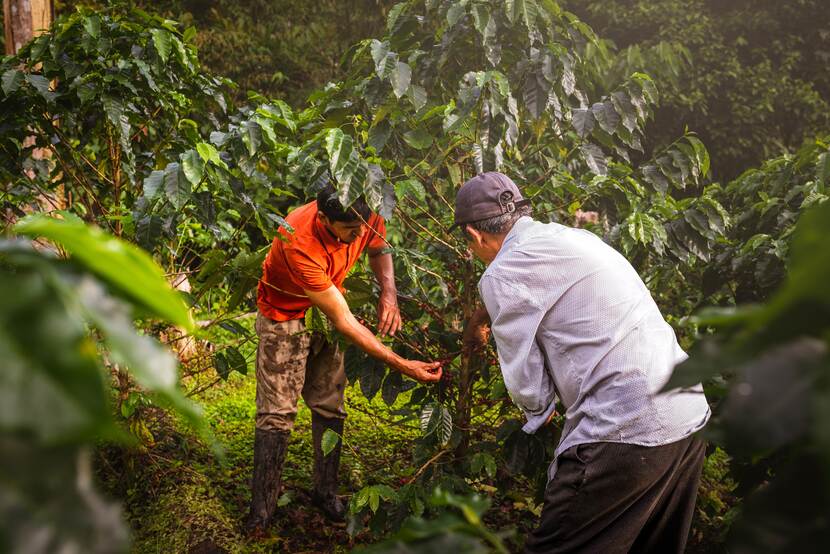
Carbon regulations can be a challenge
There is a lot of interest in expanding Acorn in Latin America, mainly due to the great impact it can generate. However, challenges are the carbon policy, law or regulations in the region. In some countries, there are no guidelines for the voluntary carbon market, which limits the potential to implement Acorn or other models. In Ecuador, for instance, there are legal restrictions that prohibit the monetization of ecosystem services.
Apart from a moratorium, an export ban on carbon, carbon ownership and the nationalization of projects are also a potential risk. Nevertheless, Acorn is carried out in Peru, Colombia and Nicaragua and will soon start in Honduras and other Central American countries while Brazil and Mexico are expected to take part soon.
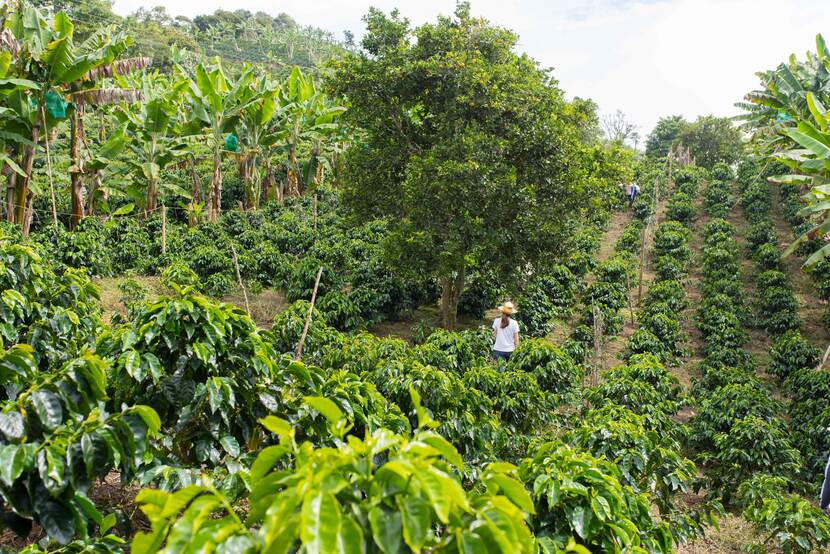
Impact on the environment and small-scale farmers
Inclusive agriculture can manifest itself in different forms and magnitudes. Although uniting it with technology may not seem the most obvious thing to do, Acorn shows that the collaboration of small producers, one of the largest banks in the world and a technology giant may help to create impact on the environment, those same small-scale producers and other actors in the value chain of the coffee industry, both in Peru and Colombia as well as in other parts of the world. Thus, this innovative model focused on agroforestry and technology can be part of a solution for a more sustainable world.
More information
Here you can find more information about the Acorn-Rabobank project: Plant a better future
Contact
Would you like to know more about the current developments in the domain of agriculture and nature in Peru or Colombia or contact the agricultural team at the Netherlands Embassy in Lima or Bogotá?
You can visit the country page of Colombia and Peru at the website agroberichtenbuitenland.nl of the Netherlands ministry of Agriculture, Nature and Food Quality. You can also send an email to BOG-lnv@minbuza.nl